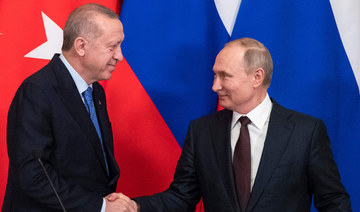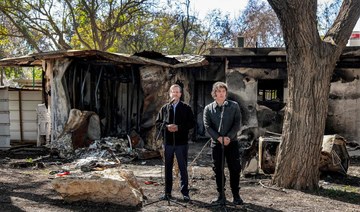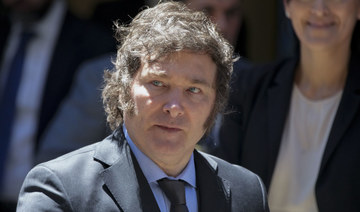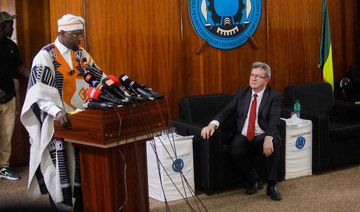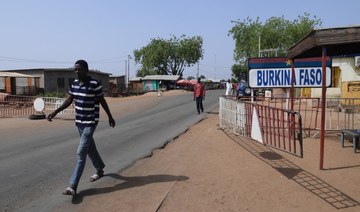LONDON: Concerns are growing that Russia will not extend a United Nations-brokered deal that allows grain to flow from Ukraine to parts of the world struggling with hunger, with ships no longer heading to the war-torn country’s Black Sea ports and food exports dwindling.
Turkiye and the UN negotiated the breakthrough accord last summer to ease a global food crisis, along with a separate agreement with Russia to facilitate shipments of its food and fertilizer. Moscow insists it’s still facing hurdles, though data shows it has been exporting record amounts of wheat.
Russian officials repeatedly say there are no grounds for extending the Black Sea Grain Initiative, which is up for its fourth renewal Monday. It’s something they have threatened before — then have twice gone on to extend the deal for two months instead of the four months outlined in the agreement.
The UN and others are striving to keep the fragile deal intact, with Ukraine and Russia both major suppliers of wheat, barley, vegetable oil and other food products that countries in Africa, the Middle East and parts of Asia rely on. It has allowed Ukraine to ship 32.8 million metric tons (36.2 million tons) of grain, more than half of it to developing nations.
The deal has helped lower global prices of food commodities like wheat after they surged to record highs following the invasion last year, but that relief has not reached kitchen tables.
Russia’s exit would cut off a source for World Food Program aid for countries at risk of famine, including Somalia, Ethiopia and Afghanistan, and compound food security problems in vulnerable places struggling with conflict, economic crisis and drought.
“Russia gets a lot of good public will for continuing this agreement,” said Joseph Glauber, senior research fellow at the International Food Policy Research Institute. “There would be a cost to pay in terms of public perception and global goodwill, I think, as far as Russia is concerned” if the deal isn’t extended.
The amount of grain leaving Ukraine already has dropped, with Russia accused of slowing joint inspections of ships by Russian, Ukrainian, UN and Turkish officials and refusing to allow more vessels to join the initiative.
Average daily inspections — meant to ensure vessels carry only food and not weapons that could aid either side — have fallen from a peak of 11 in October to just over two in June.
That has led to a decline in grain exports, from a high of 4.2 million metric tons in October to 1.3 million in May, a low for the year-old initiative. They rose to 2 million in June as shipment sizes grew.
If the deal isn’t extended, “the countries that had relied on Ukraine for their imports are going to have to look at other sources for imports, very likely Russia, which is something that I imagine Russia was intending,” said Caitlin Welsh, director of the Global Food and Water Security Program at the Center for Strategic and International Studies.
The UN has been negotiating with Russia, with Secretary-General Antonio Guterres sending a letter to Russian President Vladimir Putin this week about further implementing Moscow’s agreement, spokesman Stephane Dujarric said Wednesday.
UN trade chief Rebeca Grynspan told reporters that the UN proposal involves finding a way to enable Russia to carry out global financial transactions for its food and fertilizer shipments.
Grynspan wanted to go to Moscow this week to push for renewal of the deal, but when asked whether she was going, she replied, “It doesn’t seem so.”
Meanwhile, Ukrainian President Volodymyr Zelensky said he expects new weapons pledges from Western allies to lead to “disruptions” to the initiative.
“It is understandable: Russia always reacts this way, does not keep its word and wants to block certain humanitarian corridors to create a new crisis,” he said after the NATO summit in Lithuania.
Ukraine’s Infrastructure Ministry says 29 vessels were waiting in Turkish waters because Russia refused to allow their inspection.
Russia insists the agreement hasn’t worked for its own exports, blaming Western sanctions.
While sanctions don’t effect food and fertilizer, Moscow is seeking carveouts from restrictions on the Russian Agricultural Bank, as well as movement on its ammonia, a key ingredient in fertilizer, to a Ukrainian Black Sea port. But the ammonia pipeline has been damaged in the war, the UN said.
“There is still time to implement the part of the agreements that pertains to our country. So far, this part has not been fulfilled,” Kremlin spokesperson Dmitry Peskov told reporters last week. “And so at the moment, unfortunately, we don’t see any particular grounds for extending this deal.”
Russia, however, has increased its wheat exports to all-time highs following a large harvest. They hit 45.5 million metric tons in the 2022-2023 trade year, according to estimates Wednesday from the US Department of Agriculture. It expects another record for Russia in 2023-2024, with 47.5 million metric tons.
Meanwhile, Ukraine’s shipments have fallen by more than 40 percent from its pre-war average, with USDA expectations of 10.5 million metric tons of wheat in the coming year — a big hit to its agriculture-dependent economy.
With less from Ukraine and more from Russia, the world’s available wheat stocks are the same as in 2021 — and there is enough of it to go around, said Peter Meyer, head of grain analytics at S&P Global Commodity Insights.
Europe and Argentina are expected to boost wheat shipments, while Brazil saw a banner year for corn, of which Ukraine is also a major supplier. Meyer wouldn’t expect more than a temporary bump to grain prices on world markets if the Black Sea deal isn’t renewed.
“Markets just adapt extremely quickly,” he said. “The fact of the matter is that the global grain markets, they balance each other out.”
Ukraine can send its food by land or river through Europe, so it wouldn’t be completely cut off from selling grain, but those routes have a lower capacity than sea shipments and have stirred disunity in the European Union.
“We are a cat running out of lives in this situation,” said Simon Evenett, professor of international trade and economic development at the University of St. Gallen in Switzerland. “It only takes one thing to go wrong before we’re into trouble.”
While the UN Food and Agriculture Organization’s food price index has fallen below the record highs it hit when Russian troops entered Ukraine, food costs were already high because of COVID-19, conflict and drought.
Then Russia’s war helped push up the costs to produce food — including energy, fertilizer and transportation.
In developing nations increasingly relying on imported food, from Kenya to Syria, weakening currencies are keeping local prices high because they are paying in US dollars.
“With approximately 80 percent of East Africa’s grain being exported from Russia and Ukraine, over 50 million people across East Africa are facing hunger, and food prices have shot up by nearly 40 percent this year,” said Shashwat Saraf, the International Rescue Committee’s regional emergency director for East Africa.
“It is vital for the international community to not only forge a long-term deal but also build durable solutions to tackle food insecurity,” he said.
Russia’s threat to pull out of Ukraine grain deal raises fears about global food security
https://arab.news/yk27f
Russia’s threat to pull out of Ukraine grain deal raises fears about global food security

- Moscow insists it’s still facing hurdles, though data shows it has been exporting record amounts of wheat
- Russian officials repeatedly say there are no grounds for extending the Black Sea Grain Initiative, which is up for its fourth renewal Monday
Argentine president begins unusual visit to Spain, snubbing officials and courting the far-right

- The brash President Javier Milei has no plans to meet Spain's PM — nor any other government official
- He will instead attend a far-right summit Sunday hosted by Sánchez’s fiercest political opponent, the Vox party
BUENOS AIRES, Argentina: Even before kicking off a three-day visit to Madrid on Friday, Argentina’s libertarian President Javier Milei stirred controversy, accusing the socialist government of bringing “poverty and death” to Spain and weighing in on corruption allegations against the prime minister’s wife.
In such circumstances, a typical visiting head of state may strive to mend fences with diplomacy.
Not Milei. The brash economist has no plans to meet Spanish Prime Minister Pedro Sánchez during his three days in the Spanish capital — nor the Spanish king, nor any other government official. Instead, he’ll attend a far-right summit Sunday hosted by Sánchez’s fiercest political opponent, the Vox party.
The unorthodox visit was business as usual for Milei, a darling of the global far right who has bonded with tech billionaire Elon Musk and praised former US President Donald Trump. Earlier this year on a trip to the United States, Milei steered clear of the White House and took the stage at the Conservative Political Action Conference, or CPAC, where he railed against abortion and socialism and shared a bear hug with Trump.
Milei presented his 2022 book, “The Way of the Libertarian,” in Madrid Friday at a literary event organized by La Razón, a conservative Spanish newspaper.
The book — withdrawn from circulation in Spain earlier this month because the back-flap biography erroneously said Milei had earned a doctorate — traces his meteoric rise in politics from eccentric TV personality to national lawmaker and outlines his radical free-market economic ideas.
To thunderous applause, Milei condemned socialism as “an intellectual fraud and a horror in human terms.”
“The good thing is that the spotlight is shining on us everywhere and we are making the reds (leftists) uncomfortable all over the world,” Milei said.
He took the opportunity to promote the results of his harsh austerity campaign in Argentina, celebrating a decline in monthly inflation in April though making no mention of the Buenos Aires subway fares that more than tripled overnight.
Repeating a campaign pledge to eliminate Argentina’s central bank — without giving further details — Milei promised to make Argentina “the country with the most economic freedom in the world.”
At the event Milei gave a huge hug to his ideological ally Santiago Abascal, the leader of the hard-right Vox party and the only politician with whom Milei has actual plans to meet in Madrid.
The Vox summit Sunday seeks to bring together far-right figures from across Europe in a bid to rally the party’s base ahead of European parliamentary elections in June. Milei described his attendance a “moral imperative.” He also has plans to meet Spanish business executives Saturday.
Tensions between Milei and Sánchez have simmered since the moment the Spanish prime minister declined to congratulate the libertarian economist on his shock election victory last November.
But hostility exploded earlier this month when one of Sánchez’s ministers suggested Milei had taken narcotics. The Argentine presidency responded with an unusually harsh official statement accusing Sánchez’s government of “endangering the middle class with its socialist policies that bring nothing but poverty and death.”
The lengthy government statement also accused Sánchez of having “more important problems to deal with, such as the corruption accusations against his wife.”
The allegations of influence peddling and corruption brought by a right-wing group against Sánchez’s wife, Begoña Gómez, had prompted Sánchez, one of Europe’s longest serving Socialist leaders, to consider stepping down.
Senegal’s new president welcomes challenge to help reconcile ECOWAS with Mali, Burkina Faso, and Niger

- Ghana’s President Akufo-Addo sought Bassirou Diomaye Faye's help during their meeting in Accra on Friday
- Faye said that he hoped to convince the countries to “come back and share our common democratic values and what we stand for”
ACCRA: Ghana’s president Friday urged his visiting Senegalese counterpart to use his goodwill within the Economic Community of West African States to help resolve disputes with Niger, Burkina Faso and Mali.
President Bassirou Diomaye Faye arrived in the capital Accra early in the morning after visiting Nigeria’s President Bola Ahmed Tinubu.
Niger, Mali and Burkina Faso in January 2024 announced they were leaving ECOWAS after they were suspended by the group over military coups in all three nations.
“We are lucky to have a new leader in place because I think he is also going to help us to try and resolve the big problem that we have in the ECOWAS community,” Ghana’s President Nana Akufo-Addo said after meeting Faye.
“President Faye is very committed to seeing what he and the rest of us can do to reach out and revive the dialogue.”
Speaking to reporters after bilateral talks, Akufo-Addo said Faye had demonstrated commitment to ECOWAS efforts to bring the three countries to the table for further talks and back to the bloc.
Faye, 44, won a resounding victory as an anti-establishment candidate promising major reforms to become Senegal’s youngest-ever president.
His election has been seen as an inspiration for change in contrast to some of the continent’s aging leaders who have been in power for years and to other countries now run by military governments.
He welcomed the challenge to help reconcile ECOWAS with Mali, Burkina Faso, and Niger.
ECOWAS “is going through difficult times but we are going to do all we can to consolidate the gains made in integration, in a spirit of common, fraternal solidarity,” Faye told reporters.
Unity was “primordial” in the region, he added.
Earlier in Nigeria, Faye said that alongside Nigeria, which currently chairs ECOWAS, he hoped to convince the countries to “come back and share our common democratic values and what we stand for.”
Nancy Pelosi’s husband’s attacker jailed for 30 years

SAN FRANCISCO: A man who attacked the elderly husband of former US House Speaker Nancy Pelosi with a hammer was sentenced Friday to 30 years in prison.
David DePape was convicted last year of breaking into the couple’s San Francisco home and bludgeoning Paul Pelosi in a horrifying attack captured on police bodycam.
At the time of the October 2022 assault, Democrat Nancy Pelosi was second in line to the presidency and a regular target of outlandish far-right conspiracy theories.
Jurors in his trial last year heard how DePape — a Canadian former nudist activist who supported himself with occasional carpentry work — had initially planned to target Nancy Pelosi, planning to smash her kneecaps if she did not admit to her party’s “lies.”
On arriving at their home armed with rope, gloves and duct tape, DePape instead encountered her then-82-year-old husband, and kept asking, “Where’s Nancy?“
During what DePape told officers was a “pretty amicable” conversation with Paul Pelosi, the husband managed to call for help from law enforcement officers.
Moments later when police arrived DePape hit Pelosi with a hammer before officers rushed at him and took the weapon away.
Pelosi was knocked unconscious and had his skull fractured. He spent almost a week in a hospital, where he underwent surgery.
Nancy Pelosi was not at home the night of the attack.
Prosecutors had asked the federal court in San Francisco to sentence DePape to 40 years in prison.
In the lead up to Friday’s sentencing, Nancy Pelosi had asked the judge to impose a “very long” sentence for an attack that “has had a devastating effect on three generations of our family.”
“Even now, eighteen months after the home invasion and assault, the signs of blood and break-in are impossible to avoid.
“Our home remains a heartbreaking crime scene,” she wrote, according to court documents cited by the San Francisco Chronicle.
On Friday her office said the family was proud of Paul Pelosi “and his tremendous courage in saving his own life on the night of the attack and in testifying in this case.”
DePape had pleaded not guilty to charges that included assault on a family member of a US official, and attempted kidnapping of a US official.
While not denying the attack, his defense rested on contesting federal prosecutors’ claims that he had targeted Nancy Pelosi in her official capacity.
Instead, his lawyers argued that DePape was driven to target a number of prominent liberal figures, due to his exposure to a web of obscure conspiracy theories.
In social media posts, DePape shared QAnon theories and false claims that the last US election was stolen.
The trial heard how DePape did not intend to stop his supposed anti-corruption crusade with Pelosi, and had drawn up a list of other targets including a feminist academic whom he accused of turning US schools into “pedophile molestation factories.”
Other personalities the defendant admitted wanting to attack included California Governor Gavin Newsom, President Joe Biden’s son Hunter, and actor Tom Hanks.
Jurors took less than 10 hours to reject DePape’s explanation of the attack, which took place just a few days before the US midterm elections.
The attack itself became politicized in the weeks after it occurred, with some members of the Republican Party mocking the incident and suggesting lurid and unsubstantiated explanations for why there was a man in Pelosi’s house late at night.
US Attorney General Merrick Garland said Friday that DePape’s sentence should serve as a warning that attacks on political figures and their families were unacceptable.
“In a democracy, people vote, argue, and debate to achieve the policy outcome they desire,” he said.
“But the promise of democracy is that people will not employ violence to affect that outcome.
“The Justice Department will aggressively prosecute those who target public servants and their families with violence.”
Burkina loyalists rally after gunfire near presidency

- Burkina Faso news agency AIB reported that an individual had tried to attack a guard at the palace but there were no injuries or damage
- Junta leader Traore seized power in a coup on September 30, 2022, deposing a military regime that earlier ousted the elected president Roch Marc Christian Kabore
OUAGADOUGOU, Burkina Faso: Hundreds of demonstrators rallied in Burkina Faso’s capital Friday in support of the country’s military rulers after gunfire was reported near the presidency, AFP reporters said.
Demonstrators gathered at a roundabout in central Ouagadougou, vowing to protect the rule of President Ibrahim Traore.
Earlier in the afternoon, “there were shots fired near the presidential palace,” said one demonstrator, Moussa Sawadogo.
“We do not know what is going on but we are there to stop anything from happening.”
Burkina Faso news agency AIB reported that an individual had tried to attack a guard at the palace but there were no injuries or damage.
Security forces closed off access to the area around the palace, AFP reporters saw.
The landlocked West African nation has been run by a military regime since mutinying soldiers deposed elected president Roch Marc Christian Kabore in 2022.
Junta leader Traore then seized power in another coup on September 30, 2022.
He established a transitional government and legislative assembly for 21 months, a period set to expire on July 1.
National consultations on the next steps in the transition to civilian rule are scheduled for May 25 to 26.
Since 2015, Burkina’s forces have been struggling to combat jihadist insurgencies that have killed thousands of people and forced around two million from their homes — violence that the army’s leaders used to justify their coups.
Zelensky rejects Olympic truce call, saying it could help Russia

- Zelensky said he had spoken to French President Emmanuel Macron who made the appeal told him Russian President Putin cannot be trusted
- Putin earlier on Friday also suggested that Moscow would not support the idea of a truce during the games in Paris this summer
KYIV: Ukrainian President Volodymyr Zelensky in an interview with AFP on Friday rejected a French call for an Olympic truce this summer, saying it could just help Russia move its troops and equipment.
In an interview with AFP on Friday, Zelensky said he had spoken to French President Emmanuel Macron who made the appeal and told him: “Let’s be honest... Emmanuel, I don’t believe it.”
“Who can guarantee that Russia will not use this time to bring its forces to our territory?” Zelensky said, adding: “First of all, we don’t trust Putin.”
“We are against any truce that plays into the hands of the enemy,” he said.
“If it’s a truce, an Olympic truce for the duration of the Olympics, a land truce, they will have an advantage,” he said, explaining that there was “a risk that they will bring heavy equipment to our territory and no one will be able to stop them.”
Russian President Vladimir Putin earlier on Friday also suggested that Moscow would not support the idea of a truce during the games in Paris this summer.
Asked during a visit to China whether he backed Macron’s idea, Putin said: “I think these Olympic principles, including the ‘Olympic truce’ are very right.”
But he added: “Today’s international sporting officials are themselves disobeying the principles of the Olympic charter.”
He accused sports bodies of “not allowing our athletes to perform at the games with our banner, flag and our national music, our anthem.”
“They are committing violations against us and demand fulfilment from us. Dear friends: we won’t get far that way. No one has ever come to an agreement that way,” Putin said.
Macron had restated on Friday his idea of “an Olympic truce so that Russia ceases its current operations” in Ukraine.
Macron also thanked Chinese President Xi Jinping last week for backing the idea of a truce in all conflicts, including Ukraine, during the Paris Olympics.
Only 25 percent of needed air defense
Zelensky also said his country needed over a hundred aircraft to counter Russian air power and said Ukraine only had a quarter of the air defenses it needs.
His country has faced a surge of devastating attacks as the war stretches into its third year, leading Kyiv to double down on pleas to strengthen its depleted air defenses.
“Today we have about 25 percent of what we need to defend Ukraine. I’m talking about air defense,” Zelensky said.
Russia currently holds an advantage in the air, which limits Ukraine’s ability to protect cities and hold the front line.
To combat sustained aerial and ground assaults, Ukrainian officials have called for more support.
“So that Russia does not have air superiority, our fleet should have 120 to 130 modern aircraft... to defend the sky against three hundred (Russian) aircraft,” Zelensky said.
He also said the fighter jets were needed “to have parity” with Russia.
His comments came just weeks after the US Congress finally approved a $61-billion financial aid package for Ukraine following months of political wrangling.
Zelensky called for some of the assistance to be delivered.
“Can we have three (billion) to get two (Patriot) systems in Kharkiv region, and no bombs will fall on the heads of the military,” he said.



